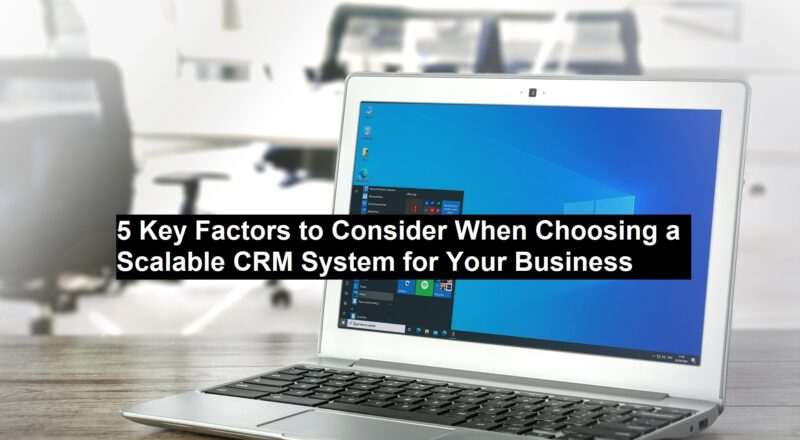In today’s ever-evolving digital landscape, harnessing Customer Relationship Management (CRM) tools is essential for managing customer relations, lest businesses fall behind. Businesses need to manage a myriad of customers, highly complex operational workflows, and data intricacies concurrently. This is where scalable CRM comes in handy. It ensures you do not need to switch systems as your organization grows.
If you are looking for CRM software for your business, knowing what to consider is important. Finding the right CRM system can assist in enhancing business operations and customer satisfaction while driving business growth. With the right automation and integration tools, a scalable CRM grows alongside business.
This article elaborates on five key factors to facilitate the long-term success of your organization:
Integration Capabilities
When choosing a CRM system for your brand, one of the key components is trying to figure out how well the system integrates with tools already in place within the organization. Positive integration with email systems and other marketing automation software and even helpdesk and ERP tools is essential for an organized workflow.
Search for integration tools that help in the simple syncing of data across various platforms. The CRM must enable seamless communication between systems regardless of the tools your business currently uses. Cloud-based CRM software with robust APIs and extensive third-party integrations increases cross-departmental efficiency and data accuracy.
Flexibility and Customization
No two businesses are the same, and neither should your CRM be. Customization means that a CRM platform can let you tailor fields, dashboards, workflows, and reports to suit your needs. Such a degree of personalization not only improves productivity but ensures that the CRM is an aid and not a hindrance.
Your business processes will change as your company grows, and the CRM you choose should be capable of accommodating those changes, such as modifying sales pipelines, automating new types of workflows, and custom report generation. In particular, flexibility is crucial for CRMs designed for growing businesses that need to adjust to ever-evolving requirements during high growth phases without incurring hefty redesign costs.
Read: 7 Email Marketing Myths That Are Hurting Your Campaigns
User-Friendliness and Training
The best business CRM software will offer plenty of features but if it is not user-friendly all else will come to naught. Ease of use enhances acceptance and lowers the effort needed to learn those the software by your team. A cluttered or overly complicated system will confuse users, resulting in poor user adoption or inconsistent usage.
Pick a provider whose CRM has complete onboarding, thorough tutorials, and offers post-training support. Training aids such as webinars, knowledge bases, and live chat expedite the training of your support staff. Select a CRM system known for responsive customer service to ensure that the issues will be handled quickly.
Security Compliance and Protection of Data
With an increase of cyberattacks and a rise in privacy regulations, security has become vital for business. Any business CRM solution needs to offer security features that protect sensitive information, like encryption, two-factor authentication, and role-based access control.
At a minimum, the system has to observe region and industry-specific requirements like GDPR, HIPAA, or CCPA. With the growth of the business database, it becomes imperative that the scalable CRM system performs without compromising data security. Usually, cloud-based systems have the upper hand since they provide real-time data backup and secure data updates.
Cost-Effectiveness and ROI
Always consider budget but remember to think beyond a CRM’s sticker price. Rather than focusing narrowly on budget, focus instead on total cost of ownership over time. For example, will the system reduce manual work through CRM workflow automation? Will it improve goals visibility to help more leads to be turned into customers?
Most CRM systems provide tiered pricing models, which allows businesses to purchase at a lower price and increase spending as they grow. What is offered in each tier? Will the business need those features in the future? A truly scalable CRM system makes it easy for clients by only charging for current requirements, with potential to increase features as the user base and team grow.
Future-Readiness and Innovation
These five factors will help you make a decision, but do not forget to consider the pace of technology trends or changes in relation to the CRM. Having AI-driven chatbots and insights as well as other predictive analytics is great for growing businesses because the software doesn’t remain stagnant.
Look for platforms that offer regular integration updates, automation tools, and other innovations to enhance user experience. Such forward-thinking features can improve how you interact with customers and scale operations efficiently.
Conclusion
Selecting a CRM System is not only one of the most important options to make to align with business goals but also requires a lot of foresight. The ideal system must appropriately match current requirements as well as morph with needs in the future. A well-planned investment in a CRM geared towards scalability will pay off in the long term if attention is paid to aspects like integration, customizability, user-friendliness, security, and ROI.
It does not matter if you are at the beginning stages or trying to shift to a next level, searching for business CRM solutions with exemplary CRM workflow automation, CRM integration tools, and flexible pricing will open doors to growth opportunities. In this customer experience landscape, a business with the right business software equipped with CRM instantly gains an edge over competitors.
